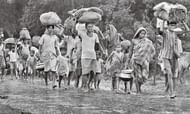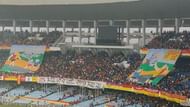During the monsoon of July 1947, the United Kingdom had just given Royal Assent to the Indian Independence Act of 1947. The Act would divide the Indian Subcontinent on religious lines into two entities, India and Pakistan. The states of Bengal and Punjab would also be divided.
On the occasion of India's Independence Day on the 15th of August 1947, millions were rendered homeless as they had to leave their homes in Pakistan and migrate to India. Thousands died in Partition Violence.
Fast forward to 1971, and the two nations of India and Pakistan were at war over the territory of East Pakistan. The events in East Pakistan resulted in a massive refugee exodus to India, and the states of West Bengal and Assam in particular. Indian forces would later intervene and liberate Bangladesh.
The 1947 Partition of India resulted in the migration of 14 million refugees. It is less widely known that 10 million refugees entered India during the Bangladesh War. With their homes and families torn apart, the devastated people found refuge in football.

East Bengal - A refuge of pride for the Refugees
East Bengal Club, founded in 1920, was the embodiment of the ethnic divide in pre-partition India and Bengal. The club saw its support base expand by millions after the two watershed moments in Indian history, the Partition of India and the Bangladesh Liberation War. Over 20 million refugees in India saw East Bengal Club as their sole identity of survival and revival of fate.
East Bengal is arguably the most supported football club in India, as generations of supporters have passed on the legacy and spirit to today's youngsters. After winning 149 trophies in 100 years, East Bengal is set to begin a new chapter in its history.
Under the moniker, 'Sporting Club East Bengal', the club makes its debut in the Indian Super League (ISL) on Thursday against ATK Mohun Bagan in the Kolkata Derby. Like all other legendary football rivalries, such as Celtic-Rangers and Club Nacional-Club Penarol, the Kolkata Derby is deeply entrenched in the local culture of its people.
Refugee der Gaan: Tribue by East Bengal Ultras
The growing Ultras movement in India owes its roots to the East Bengal Ultras. The Ultras were formed in December 2013 and has been the part of many firsts in Indian football culture. From 3D tifos, fan mosaics, smoke shows, pyro shows, and tifos aimed against the political divide in the country, the Ultras have done it all.
Also known as the Bangal Brigade, East Bengal Ultras have been one of the most vocal fan groups about the refugee identity of many East Bengal fans. The Ultras earlier brought out tifos targeting the law enforcement authorities and rival fans over the instability caused by new policies and racial slurs.

The Ultras have now come up with Refugeeder Gaan to solidify their stand on the identity of a refugee as an East Bengal fan. The song recalls the cities and towns in erstwhile Bangladesh, from where millions of migrants arrived in West Bengal in the space of 30 years post Independence.
Cities such as Dhaka, Barisal, Khulna, and Noakhali saw the highest emigration numbers during the Partition and war. The song further encapsulates the life of the refugees after arriving in India. They mention the Refugee Camps which were slowly converted into Refugee Colonies and Settlements over the years. It talks of the survival and revival from homeless masses to key stakeholders in the current Bengali society.
East Bengal Ultras will screen the Kolkata Derby in North Kolkata and this song will be played with pride, as thousands come together once again to celebrate their roots and identity in one of the most diverse yet united football rivalries in the world.
"This song is for the fans and for the club. We want every East Bengal supporter to be proud of their roots and celebrate it." said an East Bengal Ultras Crew.
The Ultras will continue to announce new songs, chants, and tifos to preserve their refugee identity, which is the soul of East Bengal Club.